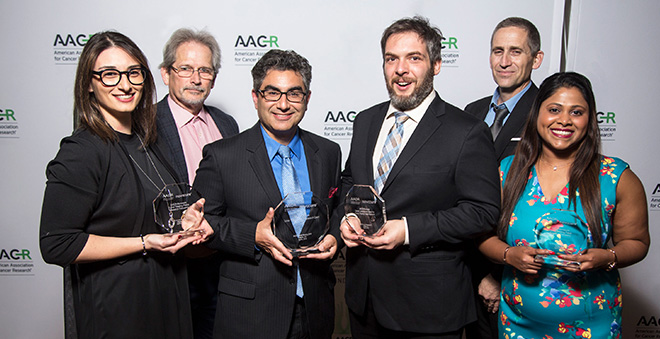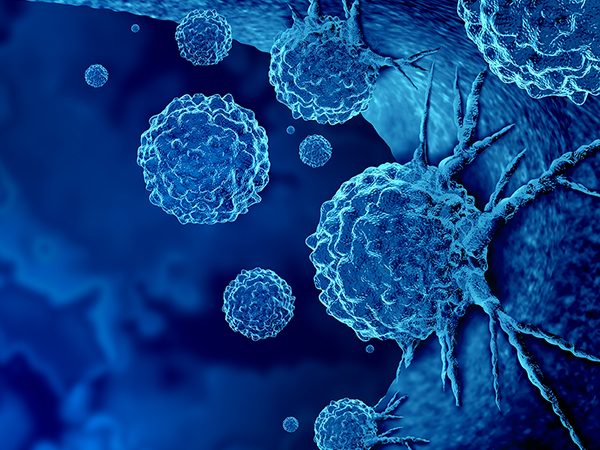New AACR-Novocure Funding Initiatives Support Tumor Treating Fields Research
Earlier this year, the American Association of Cancer Research (AACR) partnered with Novocure, a global oncology company, to launch several new funding initiatives to support innovative research focused on Tumor Treating Fields (TTFields). TTFields are a novel noninvasive cancer therapy approved by the U.S. Food and Drug Administration for the treatment of adults with glioblastoma multiforme (GBM) and malignant pleural mesothelioma (MPM). Patients wear a portable electric field generator that delivers TTFields to tumors via electrodes attached to the skin over the tumor site.
TTFields use low-intensity, intermediate-frequency, alternating electric fields to interfere with actively dividing cells, a hallmark of cancer. Our current understanding is that TTFields target cellular proteins that play crucial roles in cell division. These proteins are highly charged and therefore susceptible to the effects of electric fields. When TTFields are applied to replicating cancer cells, these proteins are caught up in the fields and therefore prevented from assuming the structural positions necessary for cell division, resulting in cell growth arrest and even cell death.
There is still more to learn about the mechanisms of action of TTFields. The grants offered by the AACR in partnership with Novocure are intended, in part, to deepen the understanding of how TTFields exert their biological effects.
Emil Lou, MD, PhD, assistant professor of medicine and medical director of the Clinical Trials Office at the Masonic Cancer Center, University of Minnesota, and a 2019 AACR-Novocure Tumor Treating Fields Research Grant recipient, notes that “many questions remain unanswered in TTFields research, including ways that tumors become refractory to TTFields treatment.” This gap in knowledge prompted Lou to begin investigating how TTFields work at the cellular and molecular levels and, more specifically, how TTFields affect tunneling nanotubes (TNTs), which are tiny, bridge-like “tunnels” involved with adjacent cell-cell communication.
Lou and his team have previously found that TNTs are universally present and increase in number in several aggressive cancer tumor types. Their preliminary work indicates that TTFields may suppress the formation and stability of TNTs connecting cancer cells. “If TNT conduits are indeed responsible for transmitting specific signals that advance tumor promotion,” Lou explains, “then disruption of these conduits would decrease intercellular trafficking and diminish the effects of these signals.” Lou’s AACR-Novocure grant will further evaluate the effects of TTFields on TNT-mediated cancer cell communication using native environment-mimicking 3D models, which Lou hopes will yield new opportunities for novel therapeutic combinations of TTFields with TNT-targeting drugs to delay tumor regrowth and invasion at the cellular level.
Indeed, another goal of the AACR-Novocure grants partnership is to accelerate the development of new treatment strategies to advance therapeutic options for cancer. Preshita Desai, PhD, a research scientist at Western University of Health Sciences and a 2019 AACR-Novocure Tumor Treating Fields Research Fellowship recipient, is also exploring how TTFields can enhance the delivery of anti-cancer drugs to pancreatic tumors.
For her project, Desai proposes to develop a smart drug delivery approach she calls “Tumor Treating Fields Triggered Targeting of Nanoparticles in Cancer (TTFields-TTONIC).” She will first formulate self-assembling nanoparticles encapsulating a conventional chemotherapy drug, gemcitabine. The components of these nanoparticles, being highly charged, are sensitive to TTFields. “So when TTFields are applied to the tumor region,” Desai explains, “these nanoparticles will dissociate, enabling targeted and controlled release of the anticancer drug.”
This drug delivery system would ensure site-specific drug release, thereby increasing treatment efficacy while concurrently reducing toxicities associated with off-site activity. If successful in preclinical models and then clinical trials for pancreatic cancer, Desai’s approach has the potential to be effective in other cancers.
Such exciting and innovative TTFields research as that proposed by Lou, Desai, and the other 2019 AACR-Novocure grantees will no doubt lead to advances in the field. From new therapeutic applications for TTFields to extending its use to cancers beyond GBM and MPM, research funded by the AACR-Novocure grants program holds much promise.
The AACR and Novocure are pleased to offer funding opportunities for TTFields research again in 2020. Applications are currently being accepted for the 2020 AACR-Novocure Tumor Treating Fields Research Grants and the 2020 AACR-Novocure Career Development Awards for Tumor Treating Fields Research. The deadline for submission is December 11. Please visit the AACR’s funding page for more information.




